Maverick Citizen: Humans of Covid-19
Tales of bravery, fear and anxiety from SA’s healthcare frontline
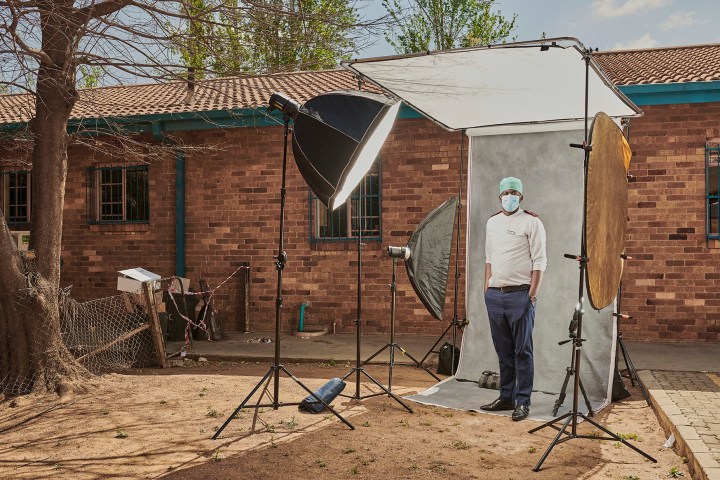
Maverick Citizen will this week share the stories of 26 workers who have been at the frontline of the Covid-19 response. These men and women work in health facilities in the nine provinces, some as doctors, others as nurses and some as mortuary workers, cleaners and porters. Journalist Nomatter Ndebele and photographer Thom Pierce undertook the challenging task of crisscrossing the country, at times under tight lockdown regulations, to document the stories of these incredible people who do not view themselves as heroes. In this first episode they go from Soweto to Mthatha to Sasolburg to Cape Town.

Sibusiso Njilo, Soweto, Gauteng. (Photo: Thom Pierce)
Sibusiso Njilo: Professional nurse, Soweto
When the Covid-19 storm started raging across Gauteng, Sibusiso Njilo was one of the frontline workers who had to undergo a quarantine period after a positive case was identified at Senaoane Clinic in Senaoane, Soweto, where he works.
Suddenly the anxiety he had felt for his patients was for himself and his family. Luckily, Njilo tested negative and he was able to get back to work to look after his community.
Although there has been widespread information about the importance and advantages of wearing masks, not everyone is playing by the rules. “Some patients will come to the clinic without wearing a mask and demand to be seen. We have to be strict and turn them away, because they are putting us, themselves and other patients at risk,” he said.
For Njilo, much of his navigating the pandemic as a professional nurse has been an exercise in maintaining strict regulations and making sure people understand that the rules are made for a reason, especially at a time such as this.
At the start of the lockdown, many people were presenting themselves at the clinic for testing after having been screened at their places of work and advised to go get tested. “We started to realise that people were coming to the clinic for testing because their temperature was 37 degrees. Their employers were sending them away and not allowing them to come back to work without testing for Covid,” Njilo said.
Although the employees considered themselves to be conscientious, they were inadvertently putting pressure on a healthcare facility that should have been saving its resources for critically ill patients. “The numbers were so high and we just didn’t have enough testing kits. We had to ask people to come back the next day,” said Njilo.
Despite having to be strict with some patients, Njilo hopes that one day his patients will look back and think of him as having been fair and committed to keeping everyone safe.
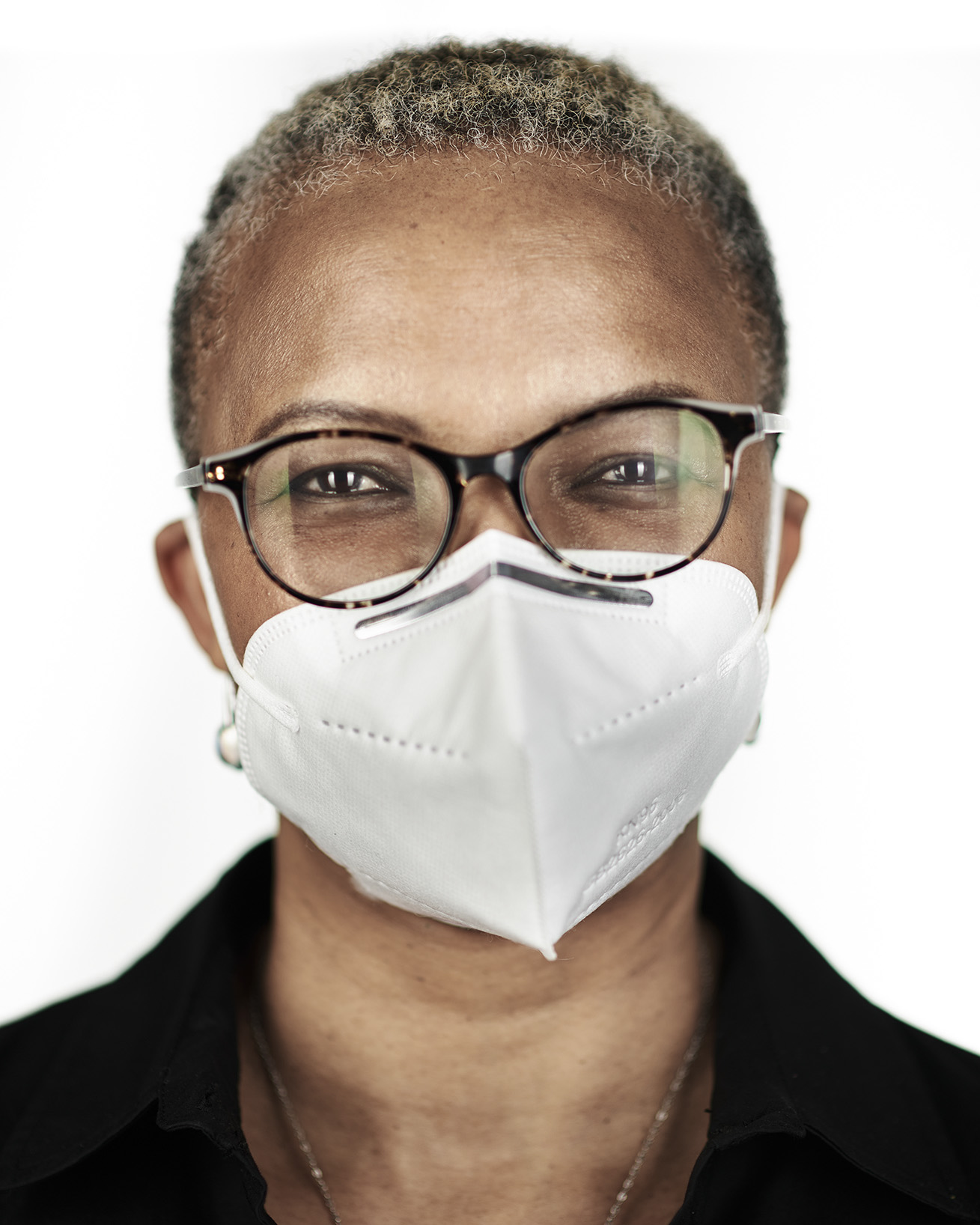
Zukiswa Zingela, Mthatha, Eastern Cape. (Photo: Thom Pierce)
Professor Zukiswa Zingela: Psychiatrist, Eastern Cape
The biggest story of this year has been the Covid-19 pandemic. One of the next big related stories – and perhaps one of the most underreported – is the mental health of everyone affected, particularly those who have no choice but to be first respondents. Healthcare professionals all over the world are giving constant health checks, reassuring and guiding the masses, and keeping people sane. But who is keeping them sane?
At every facility Maverick Citizen visited, the one line that everyone interviewed repeated: one of the biggest challenges during this time has been managing the anxieties and stresses of workers, either as a manager or a co-worker. Many people in our healthcare system have had to initiate proper stress and management processes for workers, almost overnight.
The thing about stress and stress management is that it’s different for each person. It manifests in different ways and as a result there is no one solution that will work for everybody. However, in a pandemic it is of paramount importance that the mental health of service providers is taken care of, if they are to continue providing healthcare services for patients.
With this understanding, Professor Zukiswa Zingela initiated and launched the Sisonke programme through a multidisciplinary team that lends its expertise to various aspects of clinical and social support services to healthcare workers during this time. The programme focuses on their fears and anxieties and allows them to process their stress in a healthy way.
Research from other parts of the world indicated that many frontline healthcare workers and physicians were taking their own lives, often as a result of the mental and emotional hardships they had to endure during the pandemic. It was the realisation of this potential storm that spurred Zingela to make an intervention before it was too late.
“My biggest fear was that our healthcare system was not ready to address this issue. When South Africa started to brace itself for the Covid-19 storm all kinds of resources were mobilised to capacitate the healthcare system, but the one thing that was left unattended was psychosocial support for healthcare workers during this time,” she explained.
Sisonke was launched at Mthatha Hospital in Mthatha in May 2020. Since then it has been extended to various other facilities, where hundreds of healthcare workers and support staff have benefited greatly from it. What started as an intervention at a hospital without a psychologist or social worker grew into a programme that recognised the power of a multidisciplinary approach to psychosocial challenges.
In a short space of time, the Sisonke project has grown in leaps and bounds. The programme has been fine-tuned and adapted for use in any acute crisis environment. The adaptation was initiated after the Department of Basic Education sought assistance for educators working in the pandemic.
As an example Sisonke hosted a debriefing session in Engcobo after a patient was stabbed in the hospital. The Sisonke team was asked to intervene and provide support as the facility did not have a psychologist or a social worker to counsel staff who witnessed the incident.
Although Sisonke was catalysed as a response to a pandemic, Zingela said that it was time to refocus on issues of mental health in the workplace. “It’s time to make mental health everybody’s business, and it is as urgent for us to support our healthcare workers as it is for us to provide support to our patients.”
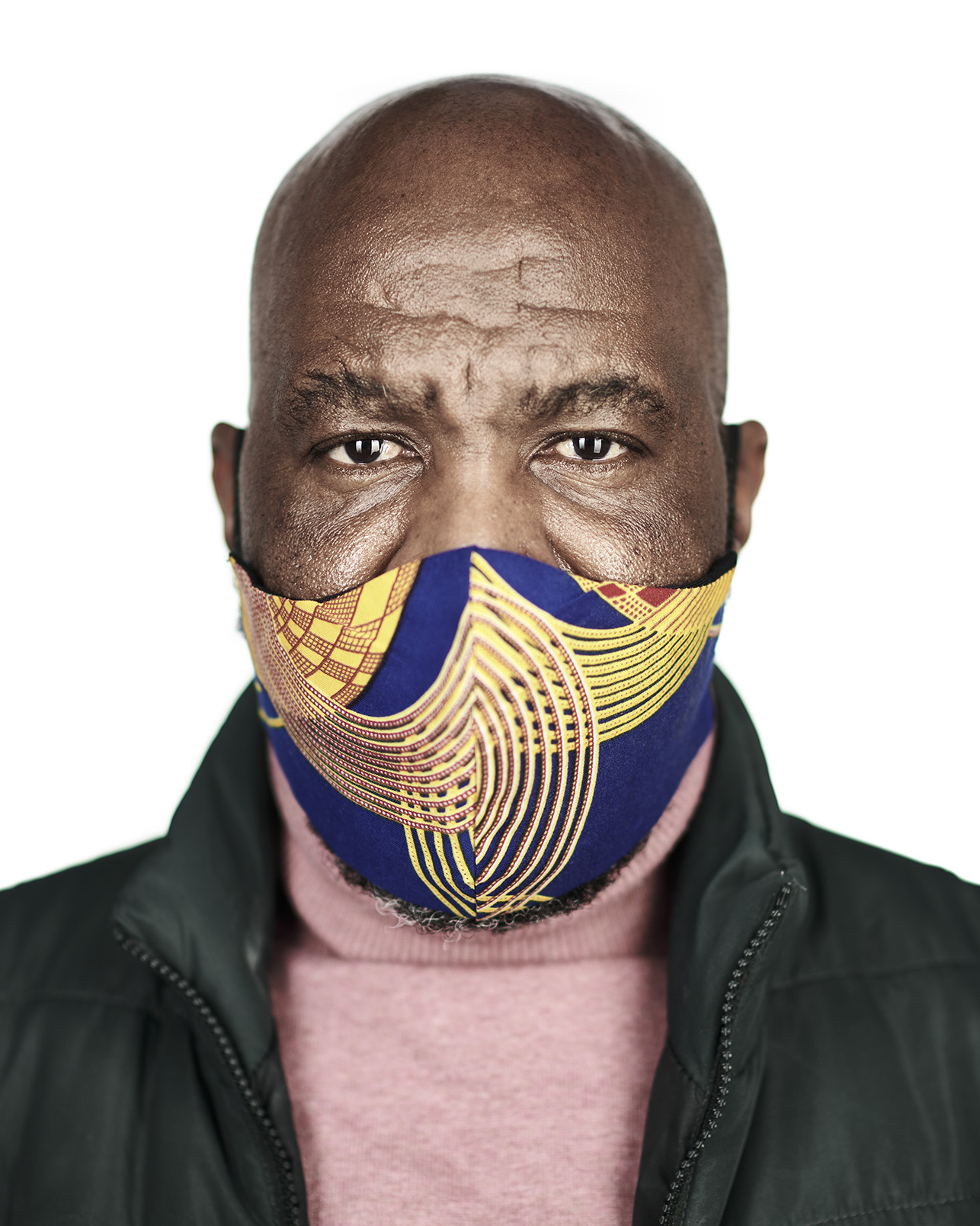
Kgomotso Phalhadira, Sasolburg, Free State. (Photo: Thom Pierce)
Kgomotso Phahladira: CEO, Fezi Ngubentombi Hospital, Free State
Just one year ago, Kgomotso Phahladira took up the position of CEO at Fezi Ngubentombi District Hospital in Sasolburg. Within six months in his post, he was faced with dealing with Covid-19, which was all being done from a zero-knowledge base. “We didn’t know anything about this virus.”
Steering the ship at the hospital during the pandemic has required what Phahladira calls a “massive balancing act”. Where hospital management used to prioritise the attainment of goals and achievements, that focus had shifted to prioritising the wellbeing of healthcare workers.
Of course there has always been a degree of concern around their wellbeing, but at a time such as this where anxieties and fears are at an all-time high it has become of paramount importance that service providers are put first.
“We need to prioritise the wellbeing of our healthcare workers and we need to manage their anxieties so that we can ensure the continuation of provision of healthcare services,” said Phahladira.
Under any circumstances, managing the stress and anxiety of a workforce is a difficult as well as delicate task — but having to do so in light of ever-changing circumstances is even harder. People’s emotions change and so do the rules of engagement. On any day, new protocols and regulations ease the anxieties of the unknown, but very soon those very protocols and regulations change again. “The instruments we use to manage the virus evolve continually in response to new information,” said Phahladira.
While Phahladira is tasked with managing the anxieties of his staff, he is also faced with managing the worries of his friends and family.
“People who know us are obviously worried about our safety, but above that, they are also worried about their own safety. There is a concern that if we become infected, we risk bringing the infections home to our families and friends,” he said.
While it has been difficult to navigate these ever-changing times, Phahladira says that he has come to appreciate the importance of communication. “Covid-19 has taught us that we cannot operate in silos.” He went on to explain that dealing with Covid was not just the responsibility of health service providers, but also that of a range of stakeholders who need to start collaborating.
“You don’t need to be in health [services] to help us combat Covid,” he said.
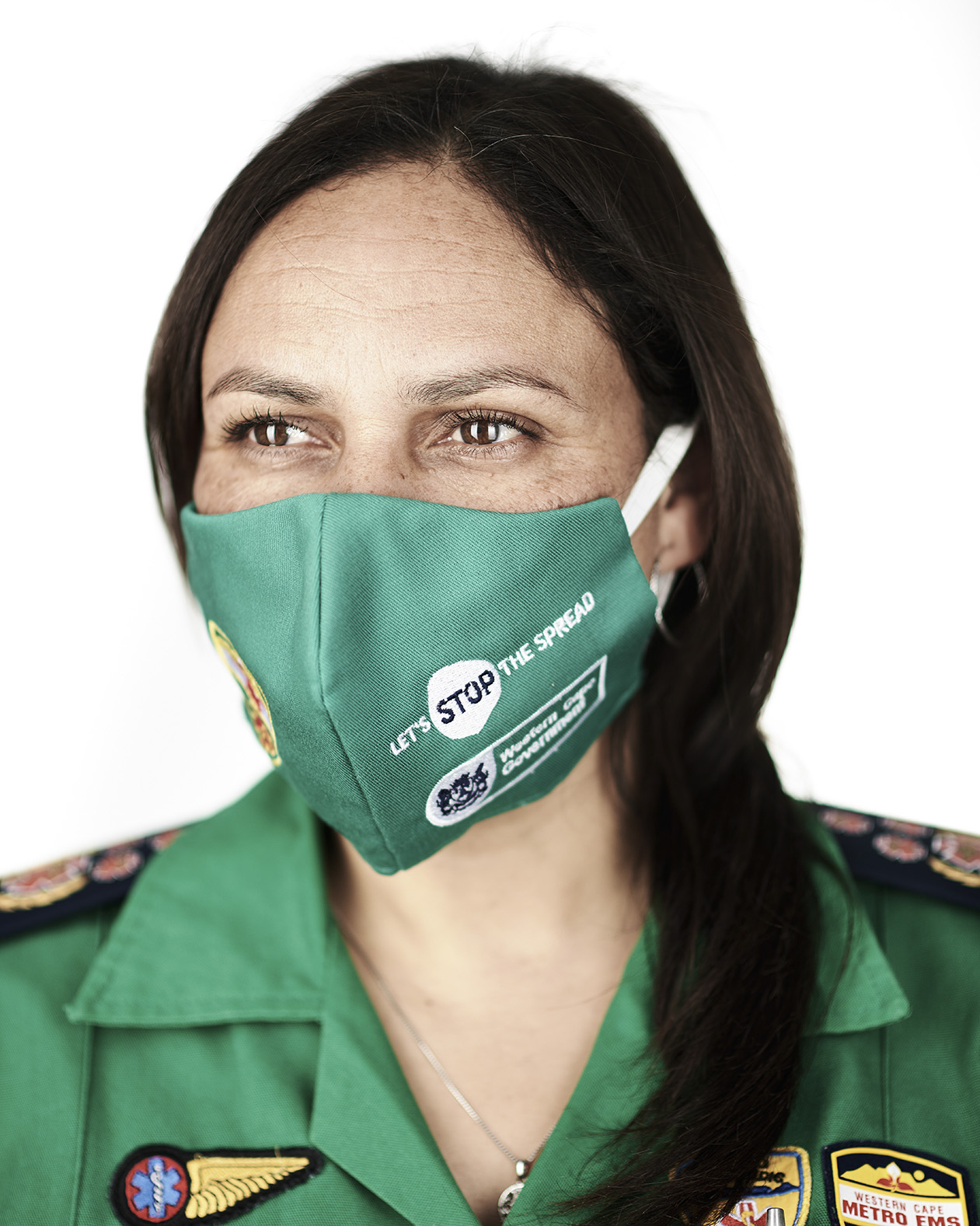
Shakira Hartley, Mitchells Plain, Western Cape. (Photo: Thom Pierce)
Shakira Hartley: Manager at Emergency Management Services, Western Cape
“Our training never prepared us to deal with 160 people who are anxious, angry or upset. My role as a manager meant that I needed to be there every day with my team. I needed to dress in personal protective equipment (PPE). I had to look like them. I couldn’t just sit in my office and dictate to them, I had to show that I was part of the team.”
Shakira Hartley says that her team has always been an extremely resilient force. The paramedics who often have to respond to cases in gang-ridden communities have always known how to get through traumatic and difficult situations. While they were challenged greatly during this time, she cannot think of a team that is more capable of pushing through this pandemic.
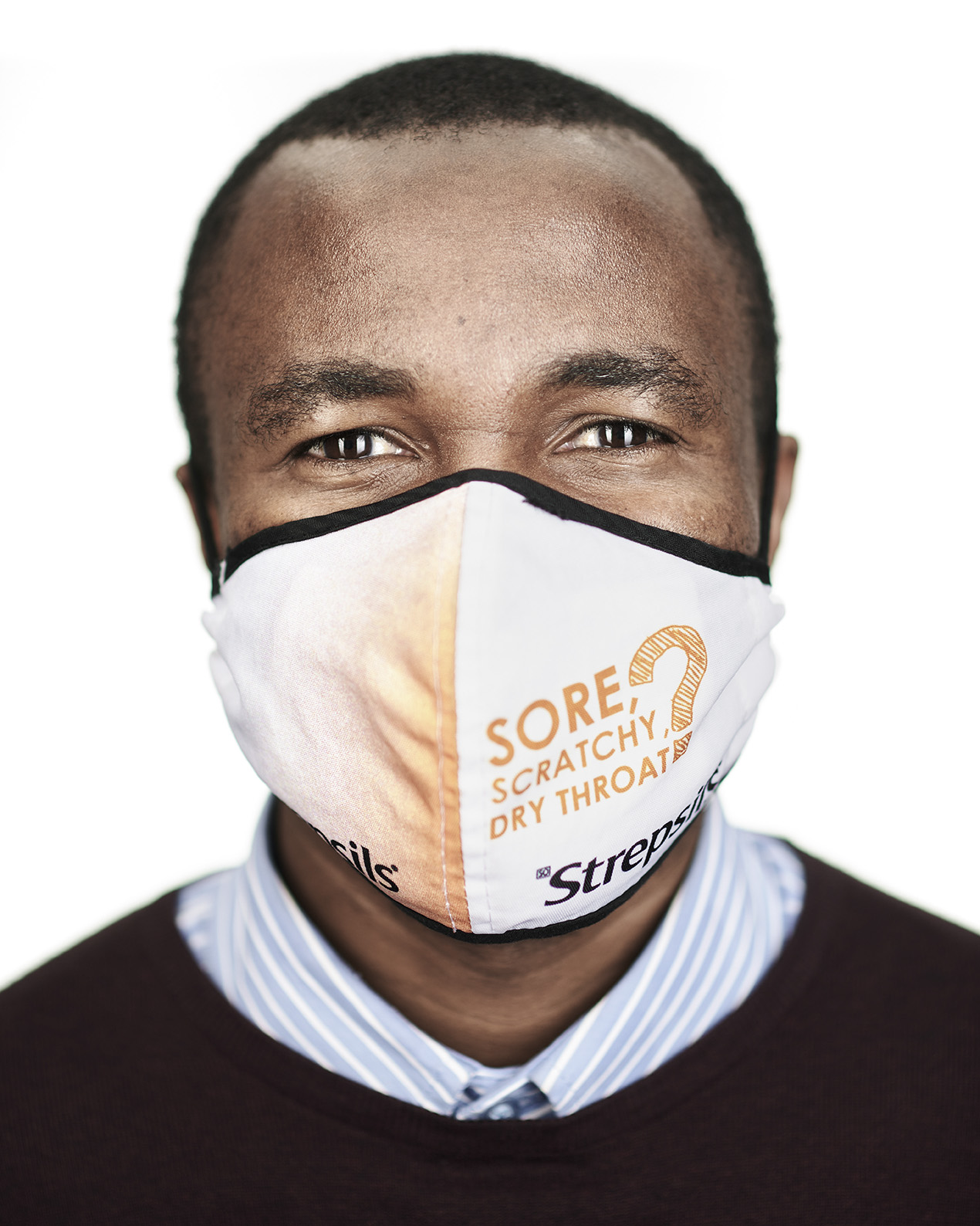
Carlton Mlauzi, Johannesburg, Gauteng.
(Photo: Thom Pierce)
Carlton Mlauzi: Pharmacist at Medicare Group, Gauteng
“We’ve diversified in light of the pandemic. And in order to maintain focus on our communities we’ve shifted from trading in the more conventional ways to being more innovative. We’ve done so more to remain relevant to our current situation and in compliance with lockdown regulations. In a way you can say we’re servicing our members in-store without them having to expose themselves to any infections.”
Before the pandemic much of Carlton Mlauzi’s responsibilities involved dispensing medication to customers. At the start of the pandemic, though, he and his colleagues were forced to start thinking about ways in which they could service their customers without putting them at risk of infection. DM/MC
Nomatter Ndebele is a writer who specialises in human interest stories. She is passionate about people and telling their stories in a way that inspires human connection. When she isn’t writing she does work in access to human rights and youth development. Nomatter has been a finalist in the Discovery Health Journalism Awards. Thom Pierce is a British photographer, currently based in Johannesburg, South Africa. His work explores the line between documentary, art and portrait photography to engage with humanitarian issues; through photographic essays, installations and exhibitions. He is passionate about human rights and using photography as a tool to connect an audience to issues of injustice. Over a period of years, his work has developed to become primarily focused on the art of activism through photography. He has won several awards for his work and has previously been chosen as a finalist in the Magnum Photography Awards and selected for the Taylor Wessing Photographic Portrait Prize Exhibition at the National Portrait Gallery in London.
"Information pertaining to Covid-19, vaccines, how to control the spread of the virus and potential treatments is ever-changing. Under the South African Disaster Management Act Regulation 11(5)(c) it is prohibited to publish information through any medium with the intention to deceive people on government measures to address COVID-19. We are therefore disabling the comment section on this article in order to protect both the commenting member and ourselves from potential liability. Should you have additional information that you think we should know, please email [email protected]"





 Become an Insider
Become an Insider